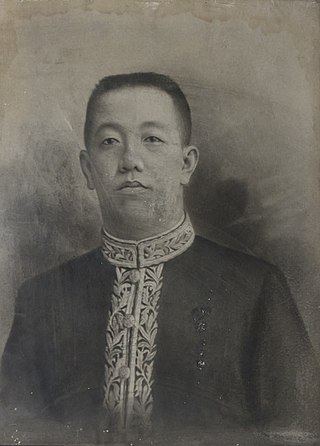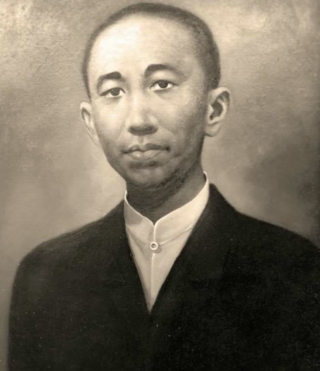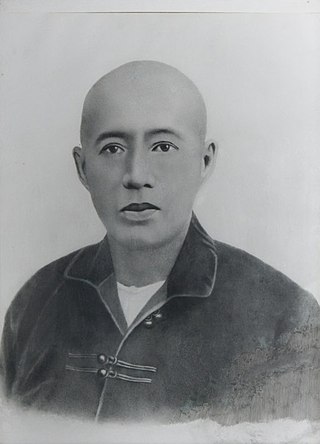Related Research Articles

Kapitan Cina, also spelled Kapitan China or Capitan China, was a high-ranking government position in the civil administration of colonial Indonesia, Malaysia, Singapore, Borneo and the Philippines. Office holders exercised varying degrees of power and influence: from near-sovereign political and legal jurisdiction over local Chinese communities, to ceremonial precedence for community leaders. Corresponding posts existed for other ethnic groups, such as Kapitan Arab and Kapitan Keling for the local Arab and Indian communities respectively.

Khouw Kim An, 5th Majoor der Chinezen was a high-ranking Chinese Indonesian bureaucrat, public figure and landlord who served as the fifth and last Majoor der Chinezen of Batavia, Dutch East Indies. The Chinese Mayoralty was the highest-ranking, Chinese government position in the East Indies with considerable political and judicial jurisdiction over the colony's Chinese subjects. The Batavian Mayoralty was one of the oldest public institutions in the Dutch colonial empire, perhaps second only in antiquity to the viceregal post of Governor-General of the Dutch East Indies.
Khouw Oen Giok Sia, later more popularly known as Oen Giok Khouw or O. G. Khouw, was a philanthropist and landowner in the Dutch East Indies. He gained notoriety for acquiring Dutch citizenship, thus breaking down the race barriers of colonial society. Today, he is best remembered for his extravagant mausoleum in Petamburan, Jakarta.
Khouw Tian Sek, Luitenant der Chinezen, popularly known as Teng Seck, was a Chinese Indonesian landlord in colonial Batavia. He is best known today as the patriarch of the prominent Khouw family of Tamboen.

The Khouw family of Tamboen was an aristocratic landowning dynasty of bureaucrats and community leaders, part of the Cabang Atas or the Peranakan Chinese gentry of colonial Indonesia.

Tio Tek Ho, 4th Majoor der Chinezen was an ethnic Chinese bureaucrat in the Dutch East Indies who served as the fourth and penultimate Majoor der Chinezen or Chinese headman of Batavia, now Jakarta, capital of Indonesia. This was the most senior position in the Chinese officership, which constituted the Chinese arm of the civil bureaucracy in the Dutch East Indies. As Majoor, Tio was also the ex officio Chairman of the Chinese Council of Batavia, the city's highest Chinese government body.
Khouw Tjeng Tjoan, Luitenant-titulair der Chinezen was a Chinese-Indonesian magnate and landlord.

Sia was a hereditary, noble title of Chinese origin, used mostly in colonial Indonesia. It was borne by the descendants of Chinese officers, who were high-ranking, Chinese civil bureaucrats in the Dutch colonial government, bearing the ranks of Majoor, Kapitein or Luitenant der Chinezen.
Khouw Tjeng Kee, Luitenant-titulair der Chinezen was a Chinese-Indonesian magnate and landlord in Batavia, capital of the Dutch East Indies.

Khouw Yauw Kie, Kapitein der Chinezen, also spelled Khouw Jaouw Kie, Yaouw Kee, was a high-ranking Chinese-Indonesian bureaucrat. He was the first scion of the influential Khouw family of Tamboen to serve on the Chinese Council of Batavia.
Tan Liok Tiauw Sia was a prominent Chinese-Indonesian landowner, planter and industrial pioneer in the late colonial period, best known today as the last Landheer of Batoe-Tjepper, now the district of Batuceper.

Tan Tjoen Tiat, 2nd Majoor der Chinezen was a Chinese-Indonesian bureaucrat who served as the second Majoor der Chinezen, or Chinese headman, of Batavia, now Jakarta, capital of Indonesia. This was the most senior Chinese position in the colonial civil bureaucracy of the Dutch East Indies. As Majoor, Tan was also the Chairman of the Chinese Council of Batavia, the city's highest Chinese government body.

Han Oen Lee, Luitenant der Chinezen (1856—1893) was a magnate of Chinese descent in the Dutch East Indies, who governed the Chinese community of Bekasi as its Luitenant der Chinezen, an important administrative post in the Dutch colonial bureaucracy. He was also the Landheer (landlord) of the particuliere land of Gaboes. Today, he is best known as the father of the late colonial statesman Hok Hoei Kan (1881—1951).
Kang Keng Tjong, also spelt Kan Keng Tiong, was a Chinese-Indonesian tycoon and one of the richest men in Batavia, capital of the Dutch East Indies.
Francisca Louisa Zecha (1848–1939), usually known as Louisa Zecha, was a prominent, colonial Indonesian community leader and the Indo-Bohemian matriarch of the Lauw-Sim-Zecha family, part of the 'Cabang Atas' gentry of the Dutch East Indies. She attracted significant attention due to her controversial interracial marriages to two Peranakan Chinese magnates, Lauw Tek Lok, Luitenant der Chinezen of Bekasi and Sim Keng Koen, Kapitein der Chinezen of Sukabumi. The posts of Kapitein and Luitenant der Chinezen were high-ranking civil administration positions in the Dutch colonial bureaucracy. Zecha's community leadership, philanthropy, personal bravery and longevity earned her widespread respect and admiration in colonial society by the time she died in 1939.
Sim Keng Koen, Kapitein der Chinezen was a Chinese-Indonesian bureaucrat and the patriarch of the influential Lauw-Sim-Zecha family, part of the 'Cabang Atas' gentry of the Dutch East Indies. He was married to Louisa Zecha, the Indo-Bohemian widow of Sim's former employer, Lauw Tek Lok, Luitenant der Chinezen of Bekasi.

Oey Djie San, Kapitein der Chinezen was a Chinese-Indonesian public figure, bureaucrat and landlord, best known for his role as Landheer of Karawatji and Kapitein der Chinezen of Tangerang. In the latter capacity, he headed the local Chinese civil administration in Tangerang as part of the Dutch colonial system of 'indirect rule'.
Tan Tiang Po, Luitenant der Chinezen, also spelled Tan Tjeng Po, was a colonial Chinese-Indonesian bureaucrat, landowner, philanthropist and the penultimate Landheer (landlord) of the domain of Batoe-Tjepper in the Dutch East Indies.

The Lie family of Pasilian was an aristocratic Chinese-Indonesian family of landlords, officials and community leaders, part of the ‘Tjabang Atas’ or the Peranakan Chinese gentry of the Dutch East Indies. For over a century, from 1847 until the 1952, members of the family served as Chinese officers, producing a total of nine office-holders, including Lie Tjoe Hong, the third Majoor der Chinezen of Batavia. The Chinese officership, consisting of the ranks of Majoor, Kapitein and Luitenant der Chinezen, was an arm of the Dutch colonial government with administrative and judicial jurisdiction over the colony's Chinese subjects.
Oey Liauw Kong, Kapitein der Chinezen (1799–1865) was a Chinese-Indonesian high official, Landheer (landlord) and head of the Oey family of Kemiri, part of the 'Tjabang Atas' or Peranakan gentry. He was also the owner of the 18th-century Baroque mansion and Jakarta landmark, Toko Merah.
References
- 1 2 Indisch weekblad van het recht (in Dutch). Batavia: G. Kolff. 1903. Retrieved 27 July 2017.
- 1 2 Sugiastuti, Natasya Yunita (2003). Tradisi hukum Cina: negara dan masyarakat : studi mengenai peristiwa-peristiwa hukum di Pulau Jawa zaman kolonial, 1870-1942 (in Indonesian). Jakarta: Universitas Indonesia, Fakultas Hukum, Pascasarjana. ISBN 9789793115115 . Retrieved 20 July 2017.
- 1 2 Knapp, Ronald G. (2013). Chinese Houses of Southeast Asia: The Eclectic Architecture of Sojourners and Settlers. Singapore: Tuttle Publishing. ISBN 9781462905874 . Retrieved 20 July 2017.
- 1 2 3 Erkelens, Monique (2013). The decline of the Chinese Council of Batavia: the loss of prestige and authority of the traditional elite amongst the Chinese community from the end of the nineteenth century until 1942. Leiden: Leiden University. Retrieved 21 July 2017.
- 1 2 3 Wright, Arnold (1909). Twentieth century impressions of Netherlands India: Its history, people, commerce, industries and resources. London: Lloyd's Greater Britain Pub. Co. Retrieved 27 July 2017.
- ↑ Lohanda, Mona (1996). The Kapitan Cina of Batavia, 1837-1942: A History of Chinese Establishment in Colonial Society. Jakarta: Djambatan. ISBN 9789794282571 . Retrieved 21 July 2017.
- ↑ Osterhammel, Jürgen (2014). The Transformation of the World: A Global History of the Nineteenth Century. Princeton University Press. ISBN 9781400849949 . Retrieved 21 July 2017.
- ↑ "NEDERLANDSCH-INDIE. BATAVIA, 28 JUNI". Java-bode : nieuws, handels- en advertentieblad voor Nederlandsch-Indie. Bruining. 28 June 1882. Retrieved 27 July 2017.
- ↑ "CIVIEL DEPARTEMENT". De locomotief. De Groot, Kolff & Co. 24 August 1883. Retrieved 27 July 2017.
- ↑ "BENOEMINGEN, ENZ. CIVIEL DEPARTEMENT". Bataviaasch nieuwsblad. Kolff & Co. 24 October 1887. Retrieved 27 July 2017.